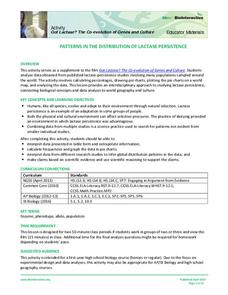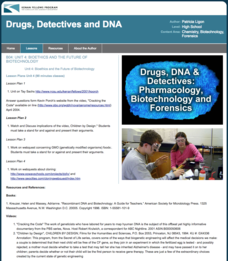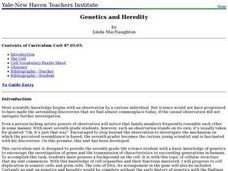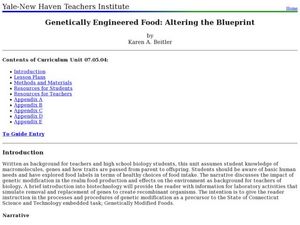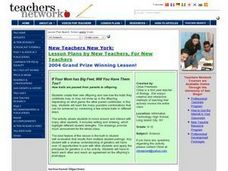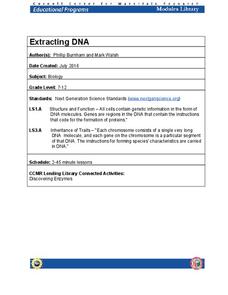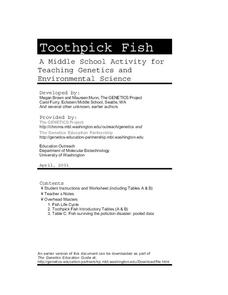Curated OER
Lesson 10: Karyotypes
Students predict traits of future offspring. In this biology lesson, students study karyotyping to predict genetic disorders. They research an assigned karyotype and present information about it.
Curated OER
Lesson 9: Visual Meiosis
Students create a fictional organism. In this biology lesson, students predict the traits of resulting offspring. They complete activity worksheet and discuss answers in class.
Curated OER
Genetics- You Are Unique
Students identify inherited traits. In this genetics lesson, students participate in a discussion about traits and use a checklist to identify inherited traits. Students complete a hand-out.
Curated OER
Dragon Genetics-Independent Assortment and Genetic Linkage
Students build chromosome models using popsicle sticks. In this biology lesson, students simulate the Law of Independent Assortment. They use Punnett squares to predict the resulting genotype and phenotype.
Columbus City Schools
Asexual and Sexual Reproduction
Can you name a type of reproduction that produces no variation in the offspring? The multimedia lesson covers both sexual and asexual reproduction through videos and discussions. It includes topics such as genetic modification, meiosis,...
Serendip
Should States Repeal Their Laws Banning First Cousin Marriage?
Around half of the states in the US ban first cousin marriage, but does science support that ban? Scholars work through genetic analysis of the risks to understand if more states should ban the practice—or if some should remove it. They...
Intel
Designer Genes: One Size Fits All?
In this STEM group of 10 activities, lesson two focuses on the question, "Just because we can, should we?" when considering genetically engineered food. Classes hear a scenario and, as young scientists and geneticists, must determine if...
Curated OER
Genome: The Secret of How Life Works
What do you have in common with a fruit fly? About 60 percent of your DNA. The resource, divided into two units, is intended for grades four to eight and another for high schoolers. Both units include eight lessons covering the...
Howard Hughes Medical Institute
Patterns in the Distribution of Lactase Persistence
We all drink milk as babies, so why can't we all drink it as adults? Examine the trend in lactase production on the world-wide scale as science scholars analyze and interpret data. Groups create pie charts from the data, place them on a...
Howard Hughes Medical Institute
Got Lactase? Blood Glucose Data Analysis
Many physicals include a blood glucose test, but what are doctors actually testing? Scholars graph and interpret blood glucose data, allowing them to observe the differences in lactase persistence and draw conclusions. They then connect...
Kenan Fellows
Unit 4: Bioethics and the Future of Biotechnology
What's the future of biotechnology? Explore a hot topic in the fourth and final unit in a series of Biotechnology lessons. Learners develop an understanding of the many issues in bioethics, then create an argument for or against the role...
Curated OER
Biology: Genetics and Heredity
Seventh graders explore the connection between genetics and heredity by examining the cellular structure. Among the numerous activities to engage students are drawing DNA molecules, vocabulary puzzle sheets, and predicting possible...
Curated OER
Genome: A Tour and Genetic Disorder Brochure
Learners use the Internet to gather information about genetics, then research a genetic disorder. In this biology lesson, students listen to an interview with a geneticist, watch an animation of "chromosome coiling", then research and...
Curated OER
Genetically Engineered Food: Altering the Blueprint
Young scholars explore the genetic engineering of food. In this health activity students explain how DNA technology can be used to produce food.
Curated OER
The Illusion of Race
This is mostly an exploration of race through an interactive website, class readings, and discussion. Individuals take an online quiz about race, they answer questions on a worksheet by visiting another website, and discover that race is...
Curated OER
If Your Mom Has Big Feet, Will You Have Them Too?
Pupils describe and apply the Mendellian principles of genetics, focusing predominantly on dominant and recessive genes. They demonstrate how two parents contribute genes and how those genes appear in their offspring. They describe...
Curated OER
The Genetics of Parenthood
Pupils explore the field of genetics. Through a graphing activity, students assess four common traits. They complete a Meiosis I and II charts which represent possible gametes for an individual. Pupils discuss phenotype and genotype...
Curated OER
Genetic Disorders
Seventh graders discuss traits, traits that are inherited and how genes and chromosomes carry the code for traits. They research genetic disorders and their link to chromosome abnormalites and write a report on their findings. which...
Curated OER
The Value of Genetic History
Students explore their genetic background. They assemble their own pedigrees using star patterns for each family member and identifying various dominant traits. Predictions are made for future offspring.
Curated OER
The Value of Genetic History
Young scholars research and assemble their own pedigrees using star patterns for each family member and coloring in various dominant traits. They arrange these patterns on long strips of paper making large, colorful family pedigrees.
Curated OER
World-wide Search for the Dominant Trait
Students receive instruction on dominant/recessive traits, access World-Wide Search for the Dominant Trait and download information on which traits to assess. They collect data on at least 20 people and prepare a data chart.
Virginia Department of Education
DNA Structure, Nucleic Acids, and Proteins
What is in that double helix? Explain intricate concepts with a variety of creative activities in a instructional activity that incorporates multiple steps to cover DNA structure, nucleic acids, and proteins. Pupils explore the history...
Cornell University
Extracting DNA
Uncover the basics of DNA structure through exploration activities. Collaborative groups build DNA models and recreate the process of replication. Then, using plant cells such as peas or strawberries, they extract a DNA sample.
University of Washington
Toothpick Fish
With colored toothpicks representing genes, youngsters practice passing them through generations of fish and learn about heredity. Consider this as an introductory activity since it does not represent recessive genes with lowercase...








